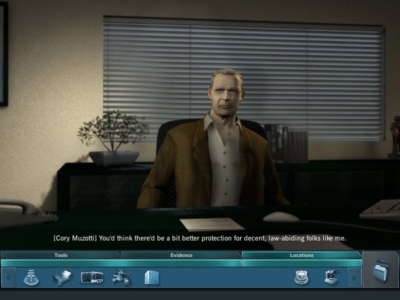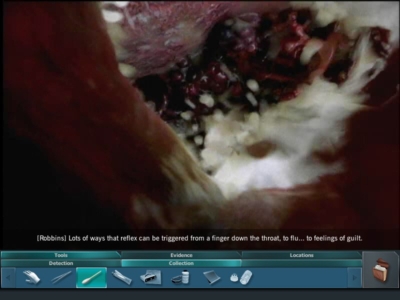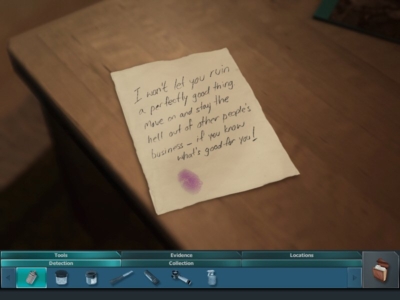
CSI: Crime Scene Investigation: Dark Motives
Written by: Rik
Date posted: March 5, 2011
- Genre: Adventure
- Developed by: 369 Interactive
- Published by: Ubisoft
- Year released: 2004
- Our score: 3
Apparently, CSI is the most watched television programme in the world. Exactly how that kind of stuff gets worked out, or what it actually means, I don’t know, but it must be true because it was in the daily free paper Metro the other day, and then when I googled it just now there were a few stories with some convincing-looking statistics in them that seemed to back up such a statement [Are you sure you never considered becoming a real journalist? – a reader].
It’s a phenomenon that had largely passed me by until I reviewed the game of the series last year, at which point my only experience of the show had been the odd snippet while channel surfing, and the first twenty minutes of a single instalment one Sunday evening when I was particularly desperate to avoid having to go to bed and face the week to come (bad idea – I fell asleep on the sofa, missed the end of the episode and woke up in the middle of the night with a crick in my neck).

Rules of CSI #45: When a suspect says “I’ve got nothing to hide”, they’ve usually got something to hide.
In the interests of research, I decided to at least try and watch a couple of complete episodes before finishing the review, and in doing so became quite partial to the show (the Las Vegas original only, though; NY is okay, but Miami, and David Caruso, can fuck off). Now, only a fool would try to argue that it’s complex, highbrow entertainment – especially if you’re talking to people who are always going on about Mad Men or forcing their box-sets of The Wire through your letterbox in an attempt to make you watch it and agree with them how brilliant it all is – but you generally know what you’re in for: two minutes of murder, The Who, then a glossy and entertaining search for the killer that generally keeps you interested until you find out who, er, dunnit. [You’re fired – Grammar Ed.]
Generally speaking, though, the slickness of the show didn’t translate all that well to the PC screen, with the first game in the series representing a tepid, atmosphere-free facsimile of the show with dodgy graphics and a creaking interface. At the end of my review I lazily put forward the supposition that more recent CSI games would probably be more polished and better all round, which is the kind of statement that deserves to be regretfully re-examined by its author should it later prove to be false.
Superficially, CSI: Dark Motives does improve on its predecessor. The graphics are noticeably more detailed than before (although there’s still not a lot of movement or animation) and there have been one or two improvements to the interface – you can now dust for prints on an item in your inventory, if you forgot to do so before picking it up, for example. And, er, some other stuff, I think? No, actually, that’s about it.
The rest, then, is pretty much the same as before. You’ve still got the same hunting for hotspots in blurry environments, trial and error gameplay, and no real sense of either solving or even being involved in a murder case like what they show you on the telly. Just like the previous game, it’s clunky, dated and painfully slow-paced.
I don’t have too many bright ideas about how to make the evidence collection and analysis bits more interesting, but I think I can say with some level of certainty that very few people, even die-hard fans of the TV show, actually want a game that accurately recreates the life of a crime scene investigator: painstaking searches, tedious analysis, the ever-cheery circumstances surrounding each case eating away at your soul…frankly, it sounds like even less fun than doing your chores in Police Quest. Whether by accident or design, though, that’s the experience we’ve got here – frustration and fiddling about, rather than urgency and intrigue.
With this in mind, and leaving the actual gameplay aside for a moment, there are plenty of other areas in which CSI: Dark Motives could be improved. For a start, each case could more closely follow the format of a typical episode. Why is there nothing to set the scene beforehand, for example? A brief clip, showing us the murder but not who did it or how, is a great way to set everything up (that’s why they do it on the show) but here you get a bland summary from your CSI partner instead. There’s no Who Are You?, either, which again would seem to be a no-brainer: any game based on a TV show should automatically attempt to recreate the credit sequence, no matter how amateurish the results.
Indeed, the overall lack of atmosphere is palpable: music and sound are underused, and though the cast once again lend their voices to the game, most of them tackle their lines with the bare minimum of enthusiasm. Your colleagues’ lack of effort also extends to their work, with each of your CSI partners remaining largely static and mute for the duration of each case, only ever commenting on what you’ve managed to find and doing no work of their own. You can talk to them while you’re on a case, but only to ask for a hint, which counts against your overall rating.
In short, you never feel part of the famous ensemble cast, and most of the time it seems as if you’re the only one in the lab doing any work, on any case, while the others sit around, bored out of their minds, as if they’ve been forced to judge a kids’ talent show as part of a community service order. Granted, a game of the show where you play a ‘new hire’ can’t help but seem slightly contrived, but I assure you: it’s possible to do a better job of involving the player than this (in fact, it has been done, with significantly fewer processing resources, on DS – see CSI: Mobile, for more).

Fans of blood, semen and vomit will find plenty to interest them here. Although there’s probably much better stuff on the internet.
The game is full of moments where you can’t help but think that things could have been done better. Let’s take the interrogation of suspects, for example, which is handled particularly poorly. Once you have sufficient evidence to bring a suspect in, Brass will oblige, but unless you have absolutely everything you could have discovered at that stage of the game, you’re not going to get maximum value from your suspect. It’ll be obvious you need more evidence when your list of questions dries up completely, and at this stage you might expect the suspect or his/her lawyer to get all huffy about wasting their precious time. Instead, though, there’s just silence: you can’t ask any more questions, but the suspect doesn’t do or say anything either – so the only option is to just leave the room. There’s nothing built into the game to end the interrogation sequence. If that wasn’t bad enough, Brass will happily call the suspect back in even if you haven’t unearthed any more evidence, as many times as you need, and what’s more, he/she won’t complain about it either.
A more sensible approach would be for the game to lead you towards collecting all evidence pointing to a suspect before allowing you to bring them in for interrogation. You collect initial evidence leading you to believe it’s one person; questioning is then either inconclusive or rules that person out, so you continue your investigation and question others until it all comes together. Okay, so that’s much more linear, and (some might say) unrealistic – with the game leading you in this way, you’re not actually doing much investigating, and there’s little room for error or omission.
Again, though, this brings us back to what you actually want from a CSI game – is it hours of head-scratching and going round in circles, with time pressures and the ever-present risk of screwing something up? Or is it a relatively undemanding but involving interactive episode of the TV show that provides the occasional challenge but otherwise zips along at a decent pace? There might be a good way to implement the former but it’s arguably more effort than it’s worth for the developers when the second option has more general appeal and is easier to achieve. CSI: Dark Motives provides neither one or the other.

Hmm…so someone messed around with some pink paint before wiping one of their fingers on this piece of paper. What could that mean? Oh, right. I’ll be gone by the end of the day, sir.
Whatever your criteria, you’d at least expect some decent cases to solve, but again Dark Motives falls short here. Despite having recently finished it (and taking notes), I honestly couldn’t tell you anything about the story. As with the previous game, there are five cases, the first four of which are more or less routine and self-contained, with the fifth providing some kind of more dramatic finale. At least, that’s the idea anyway: here, the climactic moment is spoiled somewhat by some comically bad animation, disinterested vocal performances, and a minimal background score that’s easily drowned out by the sound of your PC’s cooling fan.
I’m not sure if I was in a slightly better mood when I reviewed the last game, but upon reflection I think my score of two grey blobs [Edit: Or a score of 4, in new money] was more than generous. It’s difficult to say whether CSI: Dark Motives is slightly better or worse: on the one hand there are some improvements, but on the other, they’re minimal at best, and don’t make up for the fact that the same mistakes and flaws are again repeated, with the storylines and cases for this one arguably even less involving than last time.
Whatever: they’re both worth avoiding. And, at the risk of repeating one of my own mistakes from last time, I dare say the newer games in the series – developed by notable franchise-resurrection experts Telltale – are likely to be better than this effort. I haven’t played them though [Stop sharing your uninformed opinion, then – a reader]. Oh, okay. The TV show’s good, though – have you seen it?



 Posts
Posts